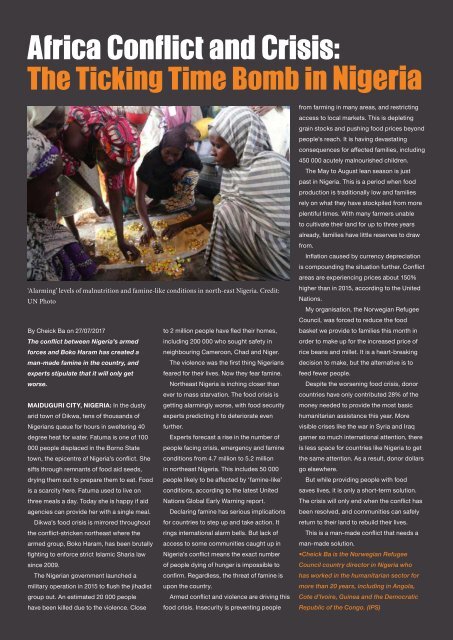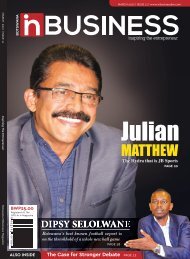inBUSINESS Issue 15
Create successful ePaper yourself
Turn your PDF publications into a flip-book with our unique Google optimized e-Paper software.
Africa Conflict and Crisis:<br />
The Ticking Time Bomb in Nigeria<br />
‘Alarming’ levels of malnutrition and famine-like conditions in north-east Nigeria. Credit:<br />
UN Photo<br />
By Cheick Ba on 27/07/2017<br />
to 2 million people have fled their homes,<br />
The conflict between Nigeria’s armed including 200 000 who sought safety in<br />
forces and Boko Haram has created a neighbouring Cameroon, Chad and Niger.<br />
man-made famine in the country, and<br />
The violence was the first thing Nigerians<br />
experts stipulate that it will only get feared for their lives. Now they fear famine.<br />
worse.<br />
Northeast Nigeria is inching closer than<br />
ever to mass starvation. The food crisis is<br />
MAIDUGURI CITY, NIGERIA: In the dusty getting alarmingly worse, with food security<br />
arid town of Dikwa, tens of thousands of experts predicting it to deteriorate even<br />
Nigerians queue for hours in sweltering 40 further.<br />
degree heat for water. Fatuma is one of 100 Experts forecast a rise in the number of<br />
000 people displaced in the Borno State people facing crisis, emergency and famine<br />
town, the epicentre of Nigeria’s conflict. She conditions from 4.7 million to 5.2 million<br />
sifts through remnants of food aid seeds, in northeast Nigeria. This includes 50 000<br />
drying them out to prepare them to eat. Food people likely to be affected by ‘famine-like’<br />
is a scarcity here. Fatuma used to live on conditions, according to the latest United<br />
three meals a day. Today she is happy if aid Nations Global Early Warning report.<br />
agencies can provide her with a single meal. Declaring famine has serious implications<br />
Dikwa’s food crisis is mirrored throughout for countries to step up and take action. It<br />
the conflict-stricken northeast where the rings international alarm bells. But lack of<br />
armed group, Boko Haram, has been brutally access to some communities caught up in<br />
fighting to enforce strict Islamic Sharia law Nigeria’s conflict means the exact number<br />
since 2009.<br />
of people dying of hunger is impossible to<br />
The Nigerian government launched a confirm. Regardless, the threat of famine is<br />
military operation in 20<strong>15</strong> to flush the jihadist upon the country.<br />
group out. An estimated 20 000 people<br />
Armed conflict and violence are driving this<br />
have been killed due to the violence. Close food crisis. Insecurity is preventing people<br />
from farming in many areas, and restricting<br />
access to local markets. This is depleting<br />
grain stocks and pushing food prices beyond<br />
people’s reach. It is having devastating<br />
consequences for affected families, including<br />
450 000 acutely malnourished children.<br />
The May to August lean season is just<br />
past in Nigeria. This is a period when food<br />
production is traditionally low and families<br />
rely on what they have stockpiled from more<br />
plentiful times. With many farmers unable<br />
to cultivate their land for up to three years<br />
already, families have little reserves to draw<br />
from.<br />
Inflation caused by currency depreciation<br />
is compounding the situation further. Conflict<br />
areas are experiencing prices about <strong>15</strong>0%<br />
higher than in 20<strong>15</strong>, according to the United<br />
Nations.<br />
My organisation, the Norwegian Refugee<br />
Council, was forced to reduce the food<br />
basket we provide to families this month in<br />
order to make up for the increased price of<br />
rice beans and millet. It is a heart-breaking<br />
decision to make, but the alternative is to<br />
feed fewer people.<br />
Despite the worsening food crisis, donor<br />
countries have only contributed 28% of the<br />
money needed to provide the most basic<br />
humanitarian assistance this year. More<br />
visible crises like the war in Syria and Iraq<br />
garner so much international attention, there<br />
is less space for countries like Nigeria to get<br />
the same attention. As a result, donor dollars<br />
go elsewhere.<br />
But while providing people with food<br />
saves lives, it is only a short-term solution.<br />
The crisis will only end when the conflict has<br />
been resolved, and communities can safely<br />
return to their land to rebuild their lives.<br />
This is a man-made conflict that needs a<br />
man-made solution.<br />
• Cheick Ba is the Norwegian Refugee<br />
Council country director in Nigeria who<br />
has worked in the humanitarian sector for<br />
more than 20 years, including in Angola,<br />
Cote d’Ivoire, Guinea and the Democratic<br />
Republic of the Congo. (IPS)<br />
www.inbusiness.co.bw | <strong>Issue</strong> <strong>15</strong> | 2017 13
















